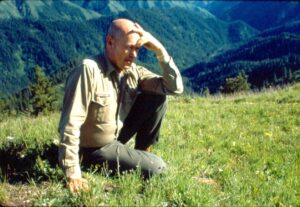
Bill Worf grew up during the Great Depression in Rosebud, Montana. During WWII, he served in the United States Marines for three years and took part in the invasion of Iwo Jima. He then returned to Montana and earned a bachelor’s degree in forestry from the University of Montana in 1950. Soon, Bill became a titan and trailblazer among conservationists. During his thirty-two-year career with the U.S. Forest Service, Bill’s many accomplishments included a supervisor post at Bridger National Forest, later renamed Bridger-Teton National Forest. The driving force of Bill’s career was “keeping wilderness wild,” undisturbed by human concepts of progress. Due to this, Bill pushed for the passage of the Wilderness Act in 1964. Bill then moved to Washington D.C. as lead of the wilderness program where he implemented policy and worked with Congress to expand the National Wilderness Preservation System. In 1969, Bill headed back West taking a post as Forest Service Regional Director for Wilderness, Recreation and Lands in Missoula.
After Bill retired from the USFS in 1981, he continued his many conservation efforts. In 1989, Bill, Bobbie Cross Guns, and Jim Dayton conceived of, and founded Wilderness Watch to ensure that federal agencies adhered to the Wilderness Act. Through this organization, Bill worked tirelessly for responsible stewardship, writing letters to policymakers, publishing editorials, and pursuing lawsuits against agencies that he felt were misusing wilderness areas. A notable example was his opposition to allowing skiing access to the Selway-Bitterroot Wilderness, which he argued, was a region “being loved to death.”
Bill was not afraid of the good fight. Whether in Washington D.C. or in his beloved Montana, Bill was a defender of the land. He continuously insisted that agencies comply with the Wilderness Act and use traditional methods for travel and work in wilderness areas. Among his numerous recognitions, Bill received the Keith Corrigall Wilderness Stewardship Award in 2003 from the International Journal of Wilderness. In 2005, Bill was honored with the Arnold Bolle award presented by the Missoula Conservation Roundtable for his lifelong dedication to preservation of wilderness areas.
Toward the end of his life, Bill began losing his eyesight. There are stories of Bill hiking wilderness areas with his white cane, while others pointed out potential hazards ahead. In 2009, Gordon Hempton and John Grossman published One Square Inch of Silence: One Man’s Search for Natural Silence in a Noisy World, with a chapter devoted to Bill, his life’s work, and his philosophies. Without Bill, wilderness tracts across the United States would look much different, or simply not exist. He was a champion of the wild, an unflinching watchdog, and a great steward of the land. Bill passed away on December 21, 2011.
By Kym MacEwan
The Missoula Conservation Roundtable gratefully acknowledges generous contributions to our website design. Our logo was created by Kate Davis, Raptors of the Rockies; Brian Christianson contributed the photographs for page headers Brian Christianson Photography
Website created by Irestone Web Design
